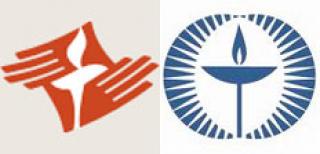UUSC partnered with the Unitarian Universalist Association (UUA) on a joint volunteer trip to Haiti, January 21-28. Trip participant Casey Aspin writes about her experience in the post below. The UUA-UUSC Haiti Volunteer Program is made possible through the contributions of UUA and UUSC donors and a generous grant from the Veatch Program of the UU Congregation at Shelter Rock, in Manhasset, N.Y.
Day Six
On our first day at the eco-village, the resident families suggested a two-hour meeting for us to get to know each other. On day six, our indefatigable Main Line Unitarian Church crew lined up to deliver more than 100 cinder blocks into the large community building (which now has a roof), followed by nine wide planks that we bought for the occasion. We created nine benches (a U-shaped arrangement with three rows per side). We shared with them the lunch we brought, and then Rev. Osterman explained the origins of Unitarian Universalism and of UUSC. Then they told of their lives after the earthquake. It was a sobering conversation. They lost family members, all their belongings, and they fought to rescue people from the rubble. Rescuers and rescuees drank rum to survive the awfulness: imagine using a machete to severe someone's limbs to free them from a collapsed building. Apparently this was quite common. One man's mother went mad from the trauma.
The leader of the group, Laurore, was a labor-rights activist who had met Chavannes Jean-Baptiste (the founder and leader of MPP) in Port-au-Prince. He called Chavannes after the quake and asked for advice. Chavannes said to come to Papaye. Laurore said he couldn't abandon the people he had worked with and their families. Chavannes said to bring them. Laurore said they had nothing but the shirts on their backs. Chavannes said that MPP would clothe them. When the one refugee's mother went mad, he asked Chavannes for help finding a nursing home in Port-au-Prince. Chavannes told the man that if he put his mother there, he would have to put Chavannes there as well. Chavannes found medication to help the woman cope. It was biblical. You can see why Chavannes is revered in the Central Plateau. And you can see why leaders of countries like Haiti (who have catered to the economic elites who control the coffee, cotton, and sugar production) have found people like Chavannes to be a threat.
The 50 people who call the eco-village their home — this cluster of cinder-block houses surrounded by mango trees with a solar-powered well — are clearly still somewhat in shock at their good fortune. They lived in hell (their word), and now they are in relative paradise. Laroire summed it up best: Before, he burned tires during protests in Port-au-Prince. Now tires provide him with his future.
We also were moved by the villagers' response to the gray- and white-haired members of our delegation. Three women in our group are 69, 70, and 71 (and carried cinder blocks, rocks, and mortar with the rest of us). They have been married longer than the life expectancy of most Haitians. The eco-village men (likely in their 20s and 30s) wanted their pictures taken with them and thanked them individually for making the sacrifice to travel to work on the village. They have probably all lost their mothers, some in the earthquake, and they were clearly moved that older women came to support them. The applause when each of the women listed their number of grandchildren and great grandchildren also, I guess, signified happiness at their longevity and ability to enjoy their offspring. I doubt many Haitians have that luxury.
